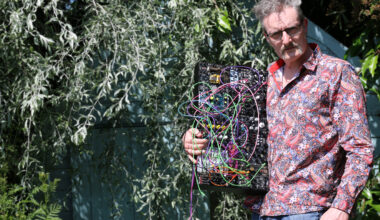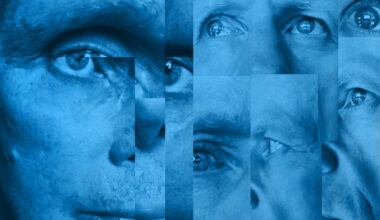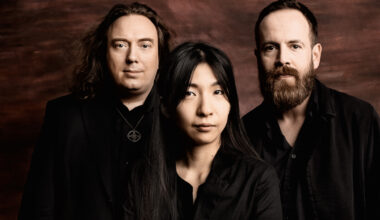From the heart of Manchester’s thriving electronic scene, Hyperdawn’s asymmetric, future-facing music moulds tape loops, cut-up sounds and strange effects into wonderfully wonky experimental shapes
The dawning of, er, Hyperdawn was more gradual than the duo’s name might imply. It was while studying at the Royal Northern College of Music in Manchester in 2015 that Vitalija Glovackyte and Michael Cutting considered experimenting together with reel-to-reel tape recorders and several home-made instruments, including an old Casio monophonic keyboard, modified with an array of jack plugs and sockets and rewired to accommodate countless different effects.
Both classically trained, multidisciplinary artists in their own right, Glovackyte and Cutting decided that their unique skill sets might work well together for a one-off 15-minute assignment. And so it proved.
‘Mario Goes Frippertronics’ became a projected installation with a title that references the Nintendo computer-game character and the dual tape machine technique popularised by Brian Eno and Robert Fripp in the early 1970s. The piece was initially performed under the Rotherhithe Tunnel on some scaffolding, and then later at an electronics festival in Glovackyte’s native Lithuania, a film of which can be found on the internet.
“Oh my god, is that still up there?” exclaims Glovackyte, clapping her hand to her mouth.
The pair laugh. Both agree that it’s time to update their respective websites. There’s certainly nothing to be ashamed of regarding the piece, but they’ve come a long way since then.
Hyperdawn released their debut album ‘Bleach’ in late 2019. It received good reviews but also ran into the liminal uncertainty of the pandemic, with a number of dates cancelled and all promotional activities curtailed. If that felt like a false dawn, though, things look to be on a more even keel with their follow-up, ‘Steady’ and they’ve clearly grown into their oddball symbiosis.
Glovackyte says Hyperdawn have mostly earned a reputation so far for live performances. They’ve become something of a fixture at the White Hotel in Salford, a hip creative hub which has helped launch the careers of contemporaries like Space Afrika, Iceboy Violet, Blackhaine and sundry artists on the Fixed Abode label.
“After a show, a lot of people comment about the focus on our faces,” she says. “There’s hundreds of things to remember within one set, because if one loop is not changed at a particular time, then a certain technique that I have on my table won’t work.”
It’s not easy to put your finger on what Hyperdawn do, but whatever it is, they’re doing it better now than ever. It’s pop, Jim, but not as we know it…
“I guess we’ve both gradually been finding our own way without any particular goal,” says Cutting. “Just always experimenting and trying to find out what it is we’re trying to say.”
And on ‘Steady’, it’s not always about what they say but how they say it. The opening track, ‘Say It So’, is based around an off-kilter ambient loop which feels as though it could melt away at any moment. ‘Basic’ is built on warped, sampled percussion and is swathed in ghostly interference. And ‘Don’t Like It’, with Glovackyte’s overladen vocal harmonies, sounds like weird industrial chamber pop. These are chopped-up pop songs fraternising with the classical avant-garde.
As musicians and as Hyperdawn, Glovackyte and Cutting co-exist in both worlds, not really belonging to either. It’s a state of limbo that they seem to enjoy.
“Hyperdawn is the main focus for both of us,” says Cutting. “We still do our own projects, and we’ve got this network of festivals and musicians that commission us based on the things we’ve done in the past. But it’s a separate world in terms of the structure of how contemporary music and pop music work, with distinct types of people, audiences and funding. So it’s interesting being in the middle. We go to experimental music festivals in India and present pop music which is outside the box. For us, it’s a natural, transitory place. A no-man’s land.”
The duo’s process involves jamming for up to 12 hours at a time with Cutting’s loops and Glovackyte’s home-made instruments. They then go about painstakingly identifying small segments that work, before extricating, manipulating and building on them. In the digital age, recording techniques have eliminated mistakes, banished hiss and quantised everything to within an inch of its life, but Hyperdawn live for the aberrations.
“Beauty is in the faults and the glitches,” says Glovackyte. “The erosion of the tape as well. Sometimes we’ve been using one loop for so long that it starts to erode with the magnetic layer coming off.”
“We deliberately look for the mistakes, basically,” adds Cutting. “That’s what we’re interested in – things that go wrong.”
He holds up some unfurled tape from a cassette that’s been crudely botched together.
“I literally just use scissors and Sellotape,” he says. “It’s not like using proper tape. We’re cutting at an angle and then trying to match the other side with the same angle, and most of the time it’s a little bit off. It’s not a seamless transition from one side of the tape to the other, and that’s deliberate. If we want a really fucked-up one, we’ll use a piece that has lots of crinkles in it.”
“We’ll take a bog-standard R&B or drum ’n’ bass beat and just completely mess it up,” continues Glovackyte. “We’ll record two seconds of it and then cut it up and reshape it entirely. You can hear that on ‘A Couple Of Strangers’ or ‘Lucky You, Lucky Me’ from the album.”
Glovackyte’s part in the musical puzzle comes from her songwriting as well as the astonishing sounds she literally brings to her table, prised from an impressive array of unlikely-looking instruments.
“But what is an instrument anyway?” she asks.
Although Glovackyte recoils from using words such as “recycling” or “upcycling”, she happily takes old motors from mobile phones, broken Sony Walkmans and discarded turntables recovered from skips, and makes gorgeous, haunting, reanimated music from them.
“My father is an engineer and my mum’s a seamstress, so it’s all about a hands-on approach to everything,” she reveals. “I really grew up with tools and a love for making things, so I try to implement that in our music. It’s all about a love of preservation, basically.”
‘Steady’ is out on Them There






